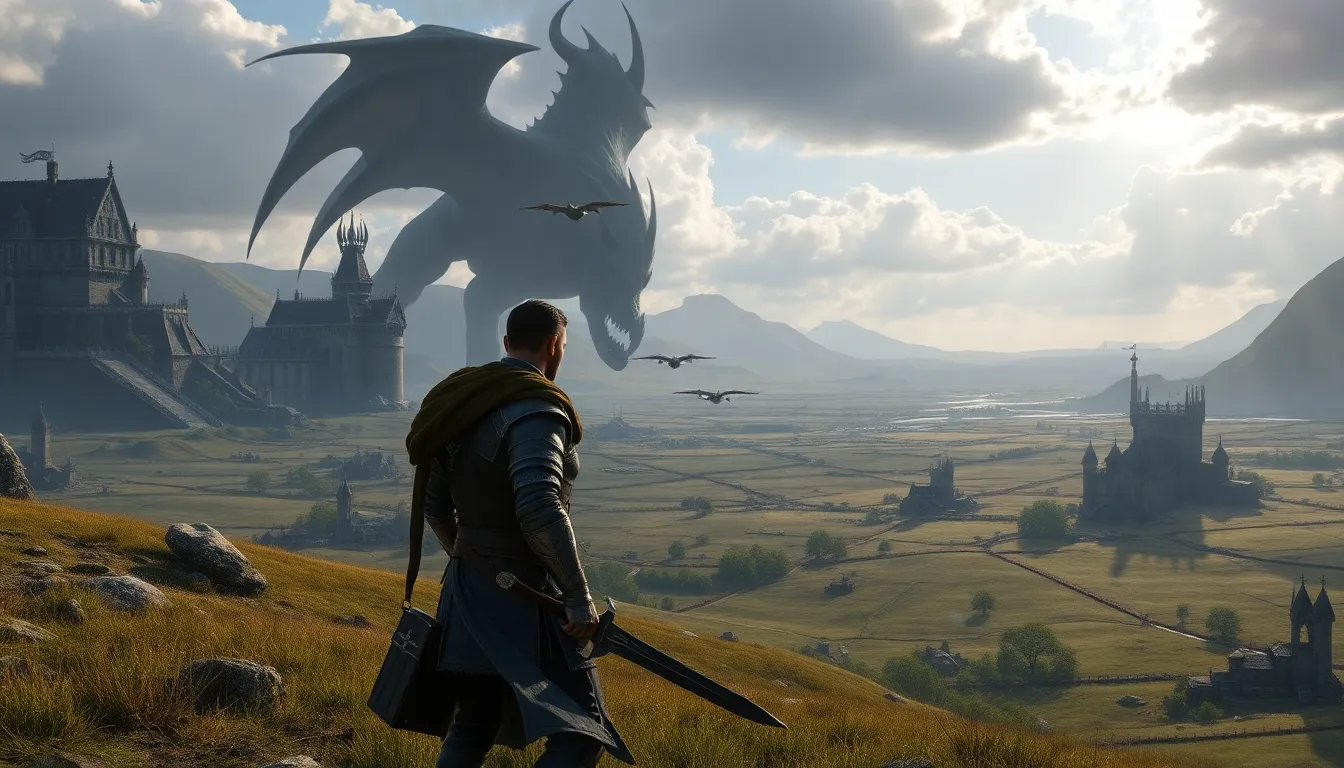Table of Contents
ToggleIn the vast and mysterious world of Elden Ring, quests serve as the backbone of the player’s journey. Each quest unfolds a unique narrative, guiding players through stunning landscapes filled with danger and intrigue. From epic battles against formidable foes to intricate puzzles waiting to be solved, the quests offer a rich tapestry of experiences that keep players engaged.
As adventurers traverse the Lands Between, they encounter a variety of characters and factions, each with their own motives and stories. These interactions not only deepen the lore but also challenge players to make choices that can significantly impact their journey. Understanding the nuances of these quests is essential for anyone looking to fully immerse themselves in the game’s captivating universe.
Overview of Elden Ring Quests
Elden Ring quests serve as critical components of gameplay, driving the narrative and engaging players in various tasks. Each quest starts with an objective, guiding players through the expansive world while unraveling rich storytelling elements.
Types of Quests
- Main Quests: These quests propel the central narrative forward and often culminate in significant gameplay milestones.
- Side Quests: Side quests provide additional lore and character development, enhancing the player’s understanding of the game world.
- NPC Quests: Non-playable character (NPC) quests involve interactions with characters, offering unique rewards and insights into their backstories.
Quest Mechanics
Quests in Elden Ring incorporate several mechanics, including:
- Exploration: Players navigate diverse environments, uncovering hidden items and lore.
- Combat: Challenges often involve battling formidable foes, testing players’ skills and strategies.
- Puzzles: Some quests feature intricate puzzles that require critical thinking, furthering engagement.
Player Choices
Choices in quests affect outcomes and relationships with characters and factions. This branching path encourages exploration of various quests and possible endings, enriching the gameplay experience.
Interconnectedness
Quests often intersect, with certain decisions triggering different outcomes in related storylines. This interconnectedness fosters a more immersive experience, revealing the consequences of player actions throughout Elden Ring.
Players seeking to fully appreciate Elden Ring’s depth should explore each quest thoroughly, as every action contributes to their journey through the Lands Between.
Major Quest Lines

Major quest lines in Elden Ring consist of intricate narratives that deepen players’ engagement with the game’s world. These quests often intertwine with character arcs, lore, and essential gameplay mechanics.
Main Story Quests
Main story quests drive the primary narrative forward, guiding players through pivotal events in the Lands Between. Each quest unfolds critical story elements and introduces key characters. Significant locations such as Stormveil Castle and Leyndell, Royal Capital feature prominently in these quests. Players encounter formidable bosses like Margit, the Fell Omen, and Godrick, the Grafted, which test their skills and strategies. Completing these quests reveals essential lore and necessary progression towards achieving the ultimate goal of becoming Elden Lord.
Side Quests
Side quests enhance the overall experience in Elden Ring, offering rich lore and unique rewards. Each side quest explores individual character stories and presents varying challenges. Players can assist characters such as Blaidd, the Half-Wolf, or Ranni, the Witch, which often leads to discovering hidden lore and enhancing weapon upgrades. Engaging in side quests allows for multiple endings and deeper exploration of the game world, reflecting personal player choices. Notably, completing these quests can yield rare items and intriguing insights into major themes within the game.
Notable Characters in Quests
Characters play a vital role in shaping quests within Elden Ring. Each character adds depth to the narrative, influencing player choices and outcomes.
Key NPCs
- Melina: Serves as a guide throughout the main story, offering support and insight. She helps players understand their motivations and the overarching quest to become Elden Lord.
- Renna: Introduces players to essential gameplay mechanics and offers the Spirit Calling Bell and Spirit Ashes. Her connection to the moon and the lore surrounding it enriches exploration experiences.
- Blaidd: An enigmatic wolfman who provides insights into the game’s world. He acts as a quest-giver, leading players to critical locations and secrets tied to the Night’s Sacred Ground.
- Ranni: A crucial figure in her quest line, Ranni’s story intertwines with magic and betrayal. She challenges players through complex quests, significantly impacting the game’s ending.
- Fia: Associated with death, Fia offers unique insights into the game’s themes. Engaging in her quest line presents moral dilemmas, further enhancing narrative depth.
Villains and Bosses
- Margit, the Fell Omen: Serves as a gatekeeper early in the game, testing players’ abilities. His formidable combat style introduces players to the difficulty and intricacies of enemy encounters.
- Godrick, the Grafted: A major story boss, Godrick’s character reveals the conflict between ambition and corruption. Defeating him propels players further into the narrative, unlocking new regions.
- Radahn: An essential figure in the story, Radahn represents the chaos of the Lands Between. His boss fight unfolds in a grand setting, offering multiple strategies for players to explore.
- Maliketh, the Black Blade: As an embodiment of darkness, Maliketh presents one of the game’s most challenging narratives. Players encounter deep lore about the nature of the Elden Ring during this battle.
- Marika, the Eternal: A pivotal character entwined with the lore of the Elden Ring, Marika’s influence shapes many quests. Her actions resonate through historical and personal narratives, impacting players’ journeys.
Quest Mechanics
Quests in Elden Ring feature structured mechanics that enhance player engagement. Players navigate through diverse quest types, each influenced by progression and choice-making.
Quest Progression
Quest progression involves several stages, moving from initiation to completion. Players typically start by receiving information from NPCs or discovering quest items in the environment. These interactions often lead to exploration, where players investigate specific locations or engage with particular enemies. As players progress, they gather items and complete objectives that advance the narrative.
Key stages in quest progression include:
- Initiation: Players receive a quest from an NPC or discover initial lore elements.
- Exploration: Players navigate the game world to gather information and items while combating enemies.
- Navigation: Players may need to solve puzzles or uncover hidden paths to proceed.
- Resolution: Players complete the quest by fulfilling objectives or defeating bosses, rewarding them with items or lore insights.
Following these stages fosters a sense of achievement and immersion within the game world.
Choices and Consequences
Choices within quests significantly affect the game’s narrative and player relationships. Decisions players make often result in different outcomes, influencing story developments and interactions with characters. Consequences can range from acquiring unique rewards to altering the fate of NPCs.
Notable aspects of choices and consequences include:
- Branching Dialogues: Players encounter multiple dialogue options that can lead to varied quest paths and resolutions.
- Faction Relationships: Aligning with or opposing factions can alter quest availability and impact the game world.
- Character Fate: Player decisions may influence key characters, determining their survival or demise and thereby affecting subsequent quests.
- Multiple Endings: Choices throughout the game often lead to different endings, encouraging exploration of various paths and outcomes.
The intricate web of choices and consequences enhances the immersive experience in Elden Ring, inviting players to reflect on their actions within the expansive narrative.
Tips for Completing Elden Ring Quests
To maximize the questing experience in Elden Ring, players should employ various strategies that enhance efficiency and enjoyment. Understanding potential challenges can prepare players for a more fulfilling journey.
Optimization Strategies
- Focus on NPC Interactions: Engaging with non-playable characters (NPCs) can unlock essential quest information and trigger critical events. Many NPCs provide valuable lore that enriches the player’s understanding of the game world.
- Track Progress: Using the quest log helps players monitor objectives and current tasks. Regularly checking this log ensures a clear sense of direction and prevents missing important steps.
- Explore Thoroughly: Discovering hidden locations and items can lead to unexpected quest opportunities. Players should explore off the beaten path to find unique encounters and resources.
- Manage Resources Carefully: Players should keep track of consumables, crafting materials, and equipment upgrades. Proper resource management can ease challenging encounters encountered during quests.
- Experiment with Builds: Customizing character builds based on quest challenges can improve performance. Players should adapt their playstyle, using different weapons and spells suited to specific encounters encountered during quest lines.
Common Challenges
- Complex Narratives: Many quests feature intricate storylines that can be difficult to follow. Players might find it challenging to connect quest lines, making it essential to revisit dialogues and notes.
- High Difficulty Levels: Certain quest bosses present significant challenges that require skill and strategy. Players may face repeated defeats if they approach these encounters unprepared, emphasizing the need for practice and adaptation.
- Missed Objectives: It’s common to overlook quest objectives, especially in extensive open-world settings. Staying attentive to environmental cues and NPC hints can help mitigate this issue.
- Time Constraints: Some quests require completing objectives within specific time frames or after specific events. Players should manage exploration and other activities to ensure that key moments aren’t missed.
- Keen Decision-Making: Choices within quests can have far-reaching consequences. Players may feel pressure when making decisions that influence outcomes, necessitating careful consideration of potential impacts.
Elden Ring quests offer an unparalleled experience that captivates players through rich narratives and diverse challenges. Each quest not only enhances gameplay but also deepens the connection to the game’s lore and characters. As players navigate the intricate web of choices and consequences, they discover a world that rewards exploration and creativity.
By embracing the unique mechanics and engaging storylines of each quest, players can truly appreciate the depth of Elden Ring. The journey through the Lands Between is filled with memorable encounters and personal growth, making every quest an essential part of the adventure. Embracing this questing experience will undoubtedly lead to a more rewarding and immersive adventure in Elden Ring.





